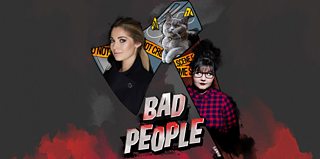Dark Fantasies
Written by Dr Julia Shaw
Perhaps the most famous exploration of the line between fantasy and crime is the ‘thoughtcrime’ that George Orwell describes in his dystopian classic Nineteen Eighty-Four – in which having thoughts that are not aligned with the controlling political party is treated as an offence.
It’s not that the thoughts could lead to crime, here the idea is that the thoughts are the crime. If you are caught having dissident thoughts, the ‘thought police’ punish you.
This week, on episode 4 of Bad People, Sofie Hagen and I explore a case that leads us to fascinating questions about the psychologically and legally difficult line between normal thoughts and dangerous thoughts.
In the name of preventing crime, at what point is it right to intervene? Can a fantasy itself be a crime, or is that just Orwellian fiction? To illustrate this, Sofie and I delve into the case of the ‘Cannibal Cop’, Gilberto Valle.

The Cannibal Cop
Valle was arrested after his wife, Kathleen, found images of women being tortured and sexually assaulted on his computer, along with online searches for phrases like “how to kidnap a woman”, “human meat recipes” and “white slavery”. He also posted fictional stories on a fetish website, detailing accounts of sexual assault and cannibalism under the username “Girlmeat hunter”.

Valle had been chatting online with men about kidnapping, killing, and eating women he knew.
Worse still, Valle had been chatting online with men about kidnapping, killing, and eating women he knew. These included his college friends, a local teenager, and his wife.
Valle was a police officer, and he had used a federal database to search for the contact information for a number of the women.
Valle was eventually found guilty of “conspiracy to kidnap” and “conducting an unauthorised computer search of a federal database”. He was imprisoned.
His conviction was later overturned by an appeal judge, and when Valle was released from prison he published his cannibal fantasy stories as books.
What makes this case so interesting is that Valle never actually did any of the things he described, he just wrote about them. Should people be imprisoned for their fantasies?
Inchoate
We live in a world where books and shows about successful serial killers, heists, and other crimes are mainstream, and we don’t miss a beat when we hear a title that sounds like a literal how-to guide for criminals - like How to Get Away With Murder. It’s a world where we seem to draw a clear line between a story and a plan, a fantasy and a threat.
We see stories and shows as fiction, or as art, or as an exercise in creativity and freedom of expression. This is not true everywhere, particularly not for those who touch on political issues, with books or movies or TV shows potentially landing people in prison.
The organisation PEN international tackles this issue, and works to defend literature and human rights. But in the UK and US it is very unlikely that you will be imprisoned for writing stories. Here, perhaps the closest we get to thoughtcrimes are ‘inchoate offences’.
The word inchoate means underdeveloped. Accordingly, these are crimes where an act hasn’t, or hasn't yet, occurred. It is the category of offences including things like attempted murder, encouraging and assisting the commission of a crime, and conspiracy to commit a crime.
Conspiracy is any agreement between two or more people to commit a crime – and this is what Valle was originally found guilty of and sent to prison for. It wasn’t writing horrific fantasies that landed him in prison, it was the emails he sent colluding with someone else to plan a crime.
But, would he really have ever gone through with it? Does it matter?
Murder Fantasies
It’s useful to consider that although fantasies of cannibalism are presumably not very common, murder fantasies are.

73% of men and 66% of women in their sample had fantasised about killing someone.
Also known as “homicidal ideation”, psychological scientists have studied murder fantasies. found that 73% of men and 66% of women in their sample had fantasised about killing someone. Was this a sample of particularly bad people? In a replication of their study they found similar rates - 79% of men and 58% of women.
Who did the participants want to murder? Men were more likely to fantasise about killing strangers and co-workers, while women fantasised about family members.
Why? As I write in my book Making Evil, some evolutionary psychologists have argued that these kinds of fantasies might be adaptive. Such fantasies are a product of our capacity for abstract thought and hypothetical planning. It allows us to wonder; if I did something so terrible, what would happen?
When we mentally rehearse such situations we realise that murdering someone probably isn’t what we actually want to do, that we couldn’t live with the consequences. Those who don’t have this capacity to mentally test potential future behaviours might act more impulsively, and live to regret it.
Bad Thoughts
So, thinking through fantasies is potentially good. But, planning to commit a crime, alone or conspiring with others, is probably bad. Where’s the line?

Thinking through fantasies is potentially good. But, planning to commit a crime, alone or conspiring with others, is probably bad.
In Valle’s case, no one was actually ever kidnapped or eaten or killed. Did he cross the line when he wrote the stories? When he looked up real people and their contact information? When he emailed with others about wanting to kidnap and eat them? Would it have been worse had be purchased the things he needed to kidnap them? To me there seems a clear escalation in such a development, and we need to be particularly worried once someone sets wheels in motion to actualise a dark fantasy. A “kidnap kit” certainly fits the bill. A story? Probably not.
In Valle’s case, while a jury thought he had crossed the line, an appeal judge did not. The judge who made the appeal decision and overturned the original verdict stated the “depraved, misogynistic sexual fantasies about his wife, former college classmates and acquaintances undoubtedly reflected a mind diseased” but that this was insufficient grounds for a conviction.
Do you agree?
Hear more about this fascinating case, listen to an excerpt from Valle’s book, and learn what research says about whether your sexual fantasies are weird or normal on episode 4 of Bad People.
Dr Julia Shaw
Dr Julia Shaw is a research associate at University College London and the co-host of the Bad People podcast on 91热爆 sounds.
She is an expert on criminal psychology, and the author of two international bestsellers “Making Evil: The Science Behind Humanity’s Dark Side” and “The Memory Illusion: Remembering, Forgetting, and the Science of False Memory.
Her website: www.drjuliashaw.com, and twitter @drjuliashaw




